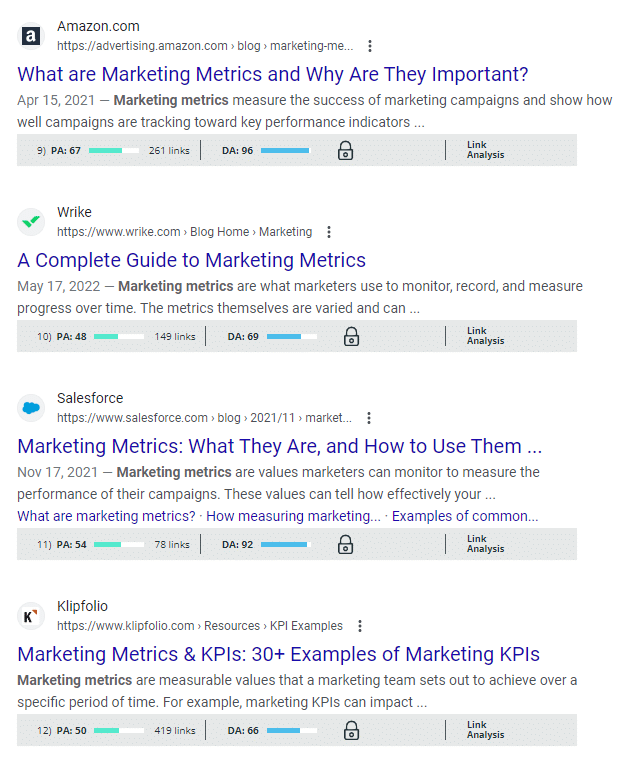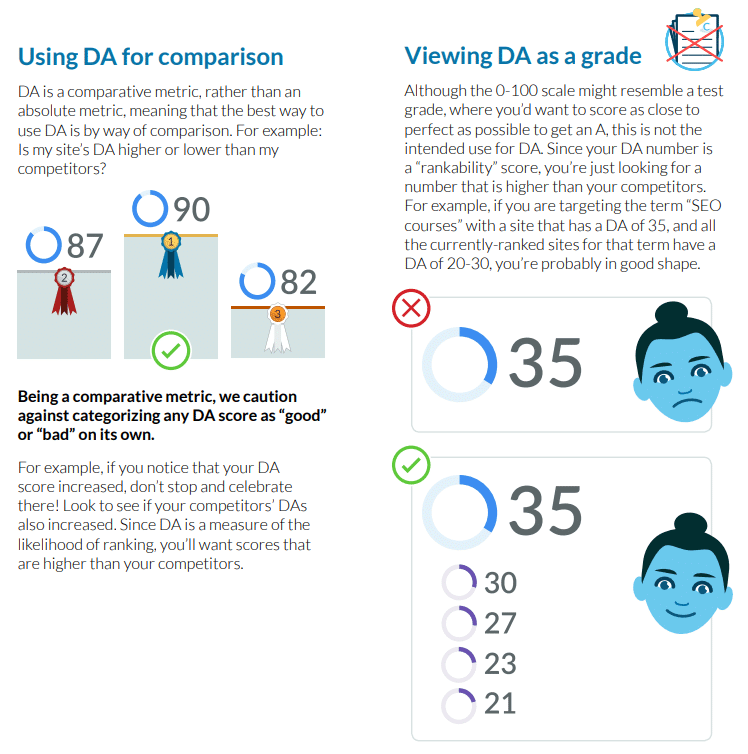When it comes to Search Engine Optimization (SEO), many factors influence page rankings.
On top of it all, the competition for the first positions is huge, and competitors know how to have websites considered a reference by Google’s algorithms.
Therefore, working on some decisive points, like Domain Authority (DA), puts your company in a prominent position.
But the million-dollar question is: exactly what is a good Domain Authority?
DA is not something you build quickly. The sooner you understand this concept, the better. After all, it takes time to create an optimized online presence.
In this blog post, we cover the following topics:
Download this post by entering your email below
What is Domain Authority?
In simple terms, Domain Authority can be defined as the importance of a site in its niche.
Technically, it is a scale that measures how likely a website is to rank well on Google’s SERP.
This metric was created by Moz, and is currently used worldwide by all companies since it greatly impacts brands’ online strategies.
Even though it is a very famous and respected indicator in the market, Google itself does not consider it when ranking sites.
However, it is important to clarify that, even so, DA is still a metric worth following.
The reason? The factors used to measure the Domain Authority of websites.
What Supports Domain Authority as a Metric
Over the years and as the study of SEO has deepened, leading authorities on the subject have come to understand what impacts website rankings.
Beyond basic web optimization issues, some specific factors have a direct influence on a domain’s authority.
Most notably, we can consider the total number of links to a site and their quality (whether they are from sites with good authority).
Quality of Information is another indirect criterion. If you create top-tier content, people will regard you as an expert. Such content earns links from high-ranking sites, boosting your domain authority.
Another criterion for domain authority is the number of competitors in your niche and their DA.
In other words, your domain authority will depend on how authoritative your site is compared to your competitors. Your score is based on the competitor status and DA levels.
If your niche has a lot of competition, you’ll likely struggle to establish domain authority. Exercise care when picking a niche and target audience for your website.
It’s better to focus your efforts and provide value to a small, targeted niche than lose domain authority trying to appeal to an overly large group.
There are other additional factors, but Moz is not so clear about what they are. However, it’s worth mentioning that Moz is not the only source that provides this metric in today’s industry.
The fact is that, so far, this metric has proven to be very close to what reality brings. Sites with good DA usually rank well in Google’s SERP.

What is a Good Domain Authority?
To know what is a good domain authority, you need to check how much a website reaches on a scale from 1 to 100, with 100 as the best possible score.
When Moz created this metric, they also made the tool available for website analysis. You can also check DA using Moz’s Keyword Explorer tool.
To rank website domain authority consider that:
- Scores between 40 and 50 are considered average.
- Domain Authority between 50 and 60 must be rated as good.
- Scores above 60 rate the Domain Authority as excellent.
It is also important to acknowledge many different contexts when evaluating DA. One of them is the average DA in your industry or the DA of pages ranking for one specific term.
If you are running a small business website with SEO optimizations underway and still get something around 40 points, that score can be considered very good.
However, the requirement changes for large company sites.
With more work and investment power, you must expect to achieve great DA values.
If the score does not reach above 60, then the evaluation is bad considering this context.
How Can I Check My Site’s Domain Authority?
Several tools for checking a site’s domain authority are available online. We listed three of the most useful ones:
Moz allows you to conduct a limited number of monthly free domain authority queries. Its free tool shows domain authority level, number of links, and top pages for the site.
To start, type in your domain name. You’ll then be prompted to make a free account. Once you’re done, click on the activation email to get started.
You can also activate the MozBar plug-in, and see DAs for every website ranking on the SERP, as the first image in this article shows.
With a paid account, you can research keywords, conduct a SERP analysis, track SEO performance, and more. You can even reverse-engineer your competition.
Moz has four pricing plans. Costs range from $99 to $599 per month. The site also offers a generous 30-day trial period.
Semrush has a free domain authority tool and a paid one. The free one shows a lot of information, including site score, links, and a comparison to competitor websites. It also shows where most of your traffic comes from.
To start, type in the URL for your site. You can then choose to do a worldwide or country-wide search. Hit enter to see the results.
However, paid users can track more than one site. They can also crawl more pages and track more keywords than users with a free account.
A Pro account costs $119.95 monthly, while a GRU account costs $229.95 monthly. You can sign up for a 7-day trial period for either of these accounts to see if they meet your needs.
Ahrefs is simple yet effective. Like other similar tools, it has both free and paid features.
Type in your domain name and click enter to see the results. Ahrefs will show your score and a list of links.
Ahrefs shows from which sites the links come. It also shows the domain authority of the sites linked to your site.
Unfortunately, if you have many links, not all will be displayed on the free plan. You have to sign up for a paid account to view more information.
Ahrefs offers four plans. Prices range from $99 to $999 per month. Each plan offers additional tools to help you evaluate and grow your site.
How Often Should I Check My Domain Authority?
Tracking Domain Authority is a job that requires consistency.
It is like baking a cake: if you don’t check the oven from time to time, the cake will surely burn.
With websites, the same monitoring is fundamental. If there is no strict monitoring of your Domain Authority, you take the risk of making your site less qualified than your competitors’.
It’s a good idea to check your domain authority after significant changes are made to your site. The changes can include updating content, changing keywords, and/or adding products.
It’s also smart to run a check if you notice a change in site traffic volume and online sales. Doing so will help you pinpoint the cause of the change so that you can rectify problems.
You may also want to check your domain authority if new competitors emerge. Seeing a competitor’s strengths and weaknesses can help you improve your digital marketing efforts.
How Important is Domain Authority for SEO?
This need for constant monitoring and updating is very common for SEO.
There is always room for improvement, and if you don’t work on it, your site will likely lose ranking positions.
Therefore, monitoring your Domain Authority is essential to ensure that more and more, you can get your site to rank high in the SERP and still get good traffic.
Next, check out some points that show how important it is to monitor this metric for your site!
Better ranking
Every company wants its website to appear in the first results of Google’s SERP.
Achieving this position requires consistent and organized SEO work. Amongst these efforts, DA helps to monitor the progress made.
The higher the score, the more likely you are to achieve a good position on the SERP. However, keep in mind that your competitors are also working to achieve the same.
In other words, good Domain Authority alone is not enough!
It is essential to comply with several SEO requirements, including exploiting keywords well, to rank high.
Good SEO work parameter
Work on SEO will never stop being important.
Google’s algorithms constantly update their parameters, so improving your site must be a continuous process.
When you know how to answer the question “what is a good domain authority”, it is because you keep DA under control.
This work is essential to ensure that your site not only ranks but achieves good positions.
Optimizations for the web will allow you to capture more qualified traffic and give your company relevance.
So if you always keep an eye on your Domain Authority results, you can also measure if your SEO work is good.
Good comparison basis
One of the main advantages of measuring Domain Authority is that you can analyze your competitors.
Just as you can analyze your URL, you can analyze companies competing with you in the marketplace. Just enter the other company’s link into the search bar on Moz’s page.
This comparison basis helps you understand how hard the marketing team has to work and what efforts they need to apply.
How can you Improve your Domain Authority?
To reach a good Domain Authority, you have to work on specific points of optimization.
Some main issues have a major impact on your site’s DA rating. Below we will show you what they are and how you can improve them.
1. Test the responsiveness of your website
Websites need to run smoothly on every device of access including mobile.
A responsive website is more likely to offer a satisfying experience to all users, regardless of whether they are on smartphones or tablets.
One of Google’s ranking factors is responsiveness. So, if your site can adapt to any type of screen, certainly this will have a good impact on your SEO.
Likewise, a site with good responsiveness can also achieve a high DA score.
2. Ensure the page loads quickly with PageSpeed Insights
Quick page loading is another key parameter for sites with good Domain Authority.
Therefore, monitoring this loading time is fundamental as a continuous task. To do this, use specialized tools such as PageSpeed Insights.
The average time is 0.5 to 2 seconds. If your site is above this limit, then you have reason to work on optimizations.
3. Get backlinks
Backlinks are essential to building an awesome Domain Authority for your website.
You just need to be careful about how you get these links. You must naturally earn them, always in mentions or partnerships with companies in the same industry.
A high-quality link profile will fundamentally impact your site’s DA, since this is the main factor considered in the score.
To get good backlinks, you should:
- Find backlink opportunities with top referral sources.
- Use outbound links to form partnerships.
- Use Google Search Console Reports to get backlinks.
- Pat attention to your competitors.
- Find broken links to build backlinks.
- Create high-quality content.
4. Acquire guest posts
Guest posts are also a great strategy to exchange backlinks with reputable companies in your market.
This way, you link your brand to other businesses that have good Domain Authority.
You must make these connections in a partnership format. This exchange of posts helps you capture the authority of another company and bring that to your audience.
Besides the expertise of partner companies, you also gain some great backlinks in the process.
So always have guest posts in your monthly planning. If you get 1 to 2 in that period, your site will start to gain more authority at a higher rate.
Wrap Up: A Good Domain Authority is a High Domain Authority
This post was intended to show what domain authority is and its impact on website ranking.
At this point, you should know that your site needs to have a high domain authority rank to succeed long-term. But building a high domain authority is a task that needs patience and expertise to achieve.
Overcoming the hurdles to achieve a high Domain Authority is crucial for long-term success. With Stage, you not only remove barriers but also optimize your WordPress site for exceptional performance. From file compression to CDN setup, Stage provides the necessary tools to boost your online presence.
Don’t let anything hinder the path to superior domain authority. Elevate your site’s performance and take center stage in the journey to success!
Ready to reach the top? Explore the possibilities and try Stage now.


![[Rock NA] State of Marketing Reports 2024 – Comkt Hubspot State of Marketing Report 2024](png/banner-fino-rock-convert-2500-%c3%97-500-px-19.png)








